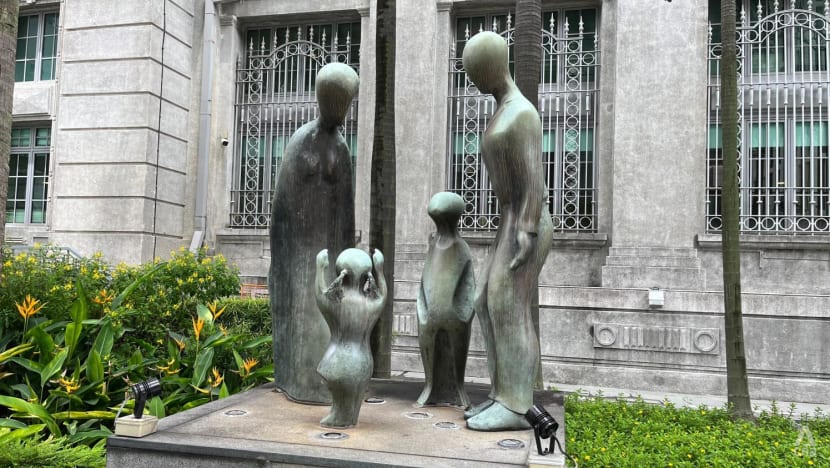Ex-nurse wins appeal against paying child maintenance, after severe COVID-19 vaccine reaction
The woman became wheelchair-bound and in need of oxygen intubation. She lost her job thereafter.

File photo of the Family Justice Courts. (File photo: CNA/Lydia Lam)
SINGAPORE: A woman has successfully appealed against a court order to contribute S$1,500 for the monthly maintenance of her children post-divorce, after suffering an adverse reaction to a COVID-19 vaccine that left her wheelchair-bound and jobless.
The woman and her husband divorced in 2016. The man then relocated to the United States in 2022, taking their two children aged 16 and 18 with him.
A district judge assessed the children's post-relocation expenses to be S$4,500 a month, and ordered the woman to contribute S$1,500.
The woman, however, had suffered a severe adverse reaction to her second dose of a COVID-19 vaccine in March 2021, according to a High Court judgment released on Friday (Jan 13).
She was hospitalised for 151 days from March to October 2021, and was diagnosed with Involuntary Movement Disorder - leaving her unable to resume her job as a nurse at Singapore General Hospital (SGH).
She eventually appealed against the order to pay S$1,500 in monthly maintenance.
In his decision granting the woman's appeal, Justice Choo Han Teck noted that the woman's medical condition did not ease after her hospitalisation.
"Her financial problems increased because of a reduction of her salary when she was on prolonged illness leave," he said.
The woman received her full monthly pay of S$8,244 for 2021, but this was halved for the first six months of 2022. She received no pay for the rest of 2022.
At the appeal hearing, she produced a letter dated December 2022 from SGH, notifying her that her employment had been terminated with immediate effect after an internal medical review found her unfit to work.
She currently receives S$2,100 a month in income, from renting out her flat.
Her ex-husband said his current income was US$5,300 or about S$7,062. He stressed that this was insufficient to cover his personal expenses as well as the expected increase in the children's expenses, with the older child entering tertiary education.
The man said he might have to sell his house if he could not manage financially.
"We have a situation where both parties are struggling financially, and there is no room to make any adjustments by way of give and take," said Justice Choo.
"A comparison between the lean and the leaner shows that the wife is virtually down to her last straws financially, having to contend with the costs of oxygen therapy and her living expenses, and no prospect of any alleviation because she can no longer work."
The husband's lawyer argued that there was no medical prognosis for the ex-wife's future fitness for employment.
But Justice Choo said it was "obvious even to counsel" that the ex-wife was wheelchair-bound and barely able to speak more than a few words audibly without suffering from "shortness of breath which reduces her voice to an inaudible whisper".
"She requires constant intubation with an oxygen tank," said the judge. "It is plain that she is in no state to undertake gainful employment."
Justice Choo said that when the district judge ordered in 2022 that the woman contribute S$1,500 monthly to her children's maintenance, he was aware that her medical condition and timeline for recovery was "indeterminate".
"As it turned out, all that has changed - what might have been a mere nightmare, has become her reality," said Justice Choo.
He gave leave to the ex-husband to reapply if the woman's health and income improves.
According to the Health Sciences Authority's latest COVID-19 vaccine safety update for the period of Dec 30, 2020 to Aug 31, 2022, 0.007 per cent of Pfizer-BioNTech/Comirnaty and Moderna/Spikevax vaccine doses administered led to reports of suspected serious adverse events.
For the Nuvaxovid vaccine, 0.03 per cent of administered doses led to serious adverse events.
For the Sinovac-CoronaVac and Sinopharm vaccines, the proportion was 0.006 per cent.














